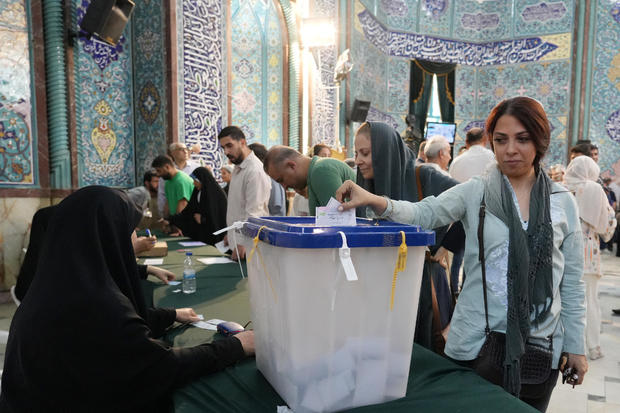Iran presidential election fails to inspire hope for change amid tension with Israel, domestic challenges
Tehran — Iranians, some of them at least, went to the polls Friday to elect a new president. The election is to pick a replacement for former President Ebrahim Raisi, a religious ultra-conservative who was killed in a helicopter crash in May.
Inflation is running at over 30%. There are few good jobs for young Iranians. Women are forced to wear headscarves — though a few still resist the mandate, despite the risk of possible harsh punishment.
Given the circumstances, you might think voters in Iran would be fired up to pick a new president. But that's not been the case.

There were debates, with six candidates squaring off on live television. But five of them are hardliners, and every one of them has been cleared to run by Iran's ruling Islamic clerics.
With options like that, people who want real change for their country saw little reason for enthusiasm. After Raisi's death, the cabinet vowed to keep the government running "without the slightest disruption." And that's exactly what most Iranians expect, for better or for worse.
The candidates staged rallies for weeks in an effort to gin up some excitement for an election that millions of Iranians regard with apathy.
On Tuesday, hoping to head off an embarrassingly low turnout, Iran's Supreme Leader Ayatollah Ali Khamenei made a point of urging people to the polls. Many conservatives will turn up to cast their votes for the candidates who've got his blessing.
Two elderly women who agreed to speak with CBS News on the streets of Tehran just before election day even seemed eager, but almost everyone else we spoke with said they would be staying home on Friday.
They know it's Khamenei who sets the agenda, and few believe a new president could make much difference.
Whoever wins is unlikely to deliver any of the changes struggling Iranians crave, or to shift Iran's policy on global issues, such as its highly contentious and still active nuclear program, its backing of proxy militant groups across the Middle East — including Hamas — or its basic anti-Americanism.
- In:
- Iran
- Ayatollah Ali Khamenei
- Election
- Middle East

Elizabeth Palmer is CBS News' senior foreign correspondent. She is assigned to cover Asia, reporting from various capitals in the region until she takes up residence in Beijing. Previously, Palmer was based in Moscow (2000-2003) and London (2003- 2021.)
Disclaimer: The copyright of this article belongs to the original author. Reposting this article is solely for the purpose of information dissemination and does not constitute any investment advice. If there is any infringement, please contact us immediately. We will make corrections or deletions as necessary. Thank you.







